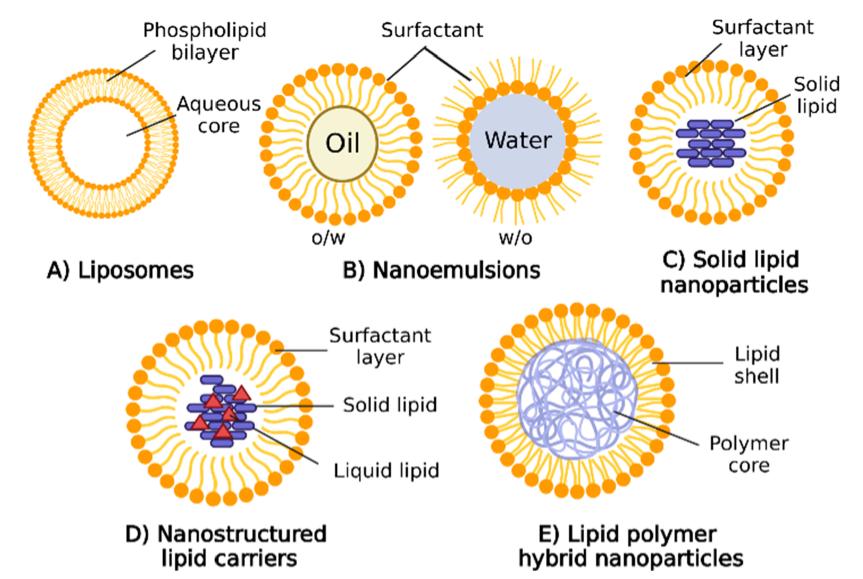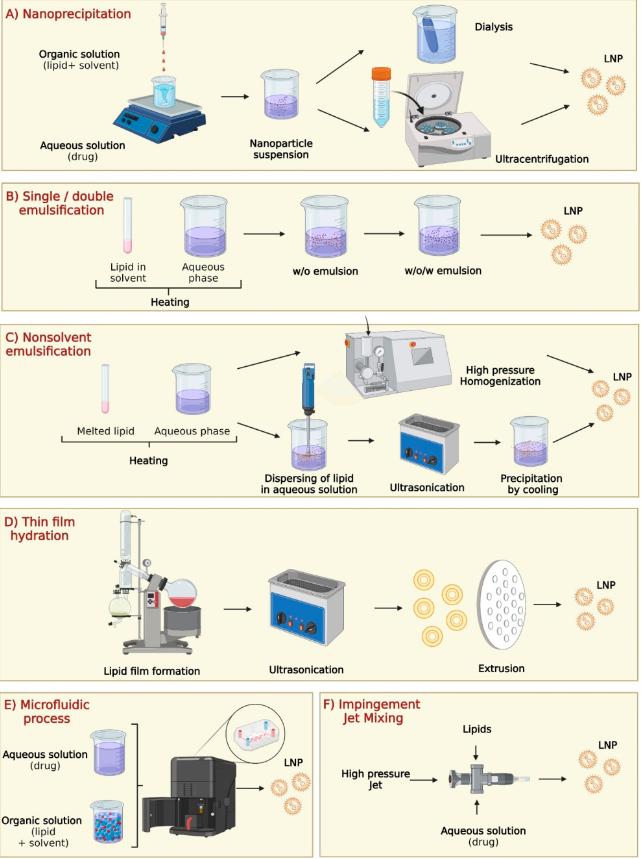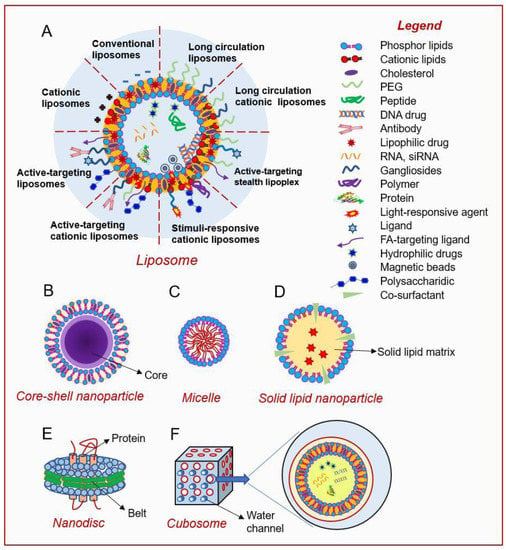Lipid Nanoparticle Technology for Nanoformulations
Inquiry
CD Formulation can provide our clients with lipid nanoparticle technology services in nanomedicines to meet customers' different requirements using our advanced lipid nanoparticle technology platforms. Relying on our highly qualified lipid nanoparticle technology platform, our team can design and synthesize lipid nanoparticles that meet customers' needs, thus promoting research and even commercialization of lipid nanoparticles.
Advantages of Lipid Nanoparticles
Lipid nanoparticles (LNPs) represent a versatile category of nanocarriers that have gained extensive utilization in the realms of nanomedicine investigation and pharmacology. This class of nanoparticles encompasses liposomes, nanoemulsions, solid lipid nanoparticles, nanostructured lipid carriers, and lipid-polymer hybrid nanoparticles. LNPs possess the capability to encapsulate a diverse array of therapeutic substances, including small molecules, nucleic acids, and monoclonal antibodies, for various medical applications. They offer numerous benefits, such as safeguarding drugs from degradation within the body, enhancing drug solubility and effectiveness, facilitating targeted drug delivery to specific disease sites, controlling drug release rates, and influencing drug distribution patterns. The utilization of lipid nanoparticle technology holds promise in addressing significant drawbacks associated with traditional therapeutic agents, such as limited efficacy, vulnerability to enzymatic breakdown, poor bioavailability, and unintended side effects.
 Fig.1 Schematic illustration depicts the structure of various LNP formulations used in drug delivery. (Meenu Mehta, et al. 2023)
Fig.1 Schematic illustration depicts the structure of various LNP formulations used in drug delivery. (Meenu Mehta, et al. 2023)
Applications of Lipid Nanoparticle Technology
A lipid nanoparticle technology platform has been established based on our innovative and rich experience in lipid nanoparticle development and characterization. It is widely used for drug delivery, gene therapy and theranostic field.
Drug Delivery
Lipid nanoparticles have been used as drug delivery vehicles to treat a variety of diseases, including brain disorders, cancer, and infections.
Gene Therapy
Lipid nanoparticles can deliver siRNA, mRNA, DNA or gene editing complexes to treat diseases such as liver disease, blindness, tumors, etc. by silencing disease-causing genes, expressing therapeutic proteins or correcting gene defects.
Theranostic Purposes
Lipid nanoparticle technology for theranostic applications can be categorized based on different approaches as follows:
- Based on the type of biomaterial used for its development, including lipids or in the case of hybrid systems, other molecules such as polymers, peptides, antibodies, ligands, and carbohydrates.
- Based on its structure, such as SLN, NLC, LNC, and CLN.
- Based on its functionality and mechanism of action, which is directly related to the properties of the biomaterial used and the final self-assembled nanostructure, such as stimuli-responsive behavior.
- Based on its incorporated or encapsulated diagnostic and therapeutic molecules, which are related to the intended application and diagnostic modality.
Lipid Nanoparticle Technology Platform at CD Formulation
A lipid nanotechnology platform has been created to allow for precise and consistent production of lipid nanoparticles, enabling reliable investigation of the relationship between structure and function. This platform supports the optimization of lipid nanoparticle formulations and also enables large-scale manufacturing, which could lead to the clinical application of lipid nanoparticles. CD Formulation offers customers a range of advanced fabrication and characterization services for various high-quality lipid nanoparticles, including liposomes, nanoemulsions, solid lipid nanoparticles, nanostructured lipid carriers, and lipid polymer hybrid nanoparticles, based on our established lipid nanoparticle technology platform.
Lipid Nanoparticle Production Technologies
We have constructed a lipid nanoparticle technology platform for the preparation of specific lipid nanoparticles based on different fabrication methods.
Nanoprecipitation is mainly used to encapsulate hydrophobic drugs, and this technology mainly relies on the precipitation mechanism. We constantly mix two miscible solvents (organic phase and aqueous phase) under moderate magnetic stirring to promote the spontaneous formation of LNPs.
- Single/Double Emulsification
The single oil/water solvent emulsification method is a common technique for preparing LNPs loaded with hydrophobic drugs. We preheat the solvent mixture, add water, and then emulsify the mixture to form a water-in-oil emulsion. These emulsions are transferred to cold water and stirred continuously to crystallize the LNPs.
The double emulsification technique was developed for the preparation of hydrophilic-loaded LNPs. In this method, we form a primary water-in-oil (w/o) emulsion by emulsifying an aqueous solution in a molten lipid solvent. The primary water-in-oil (o/w) emulsion is then dispersed in another aqueous solution containing a hydrophilic emulsifier in the form of droplets to form a double water-in-oil-in-water (w/o/w) emulsion using ultrasound or membrane emulsification.
- Nonsolvent Emulsification
Nonsolvent emulsification technology is a solvent-free method in which we use molten lipids as the liquid phase to create water-in-oil emulsions through high-pressure homogenization or ultrasonic methods.
Thin film hydration is a method widely used in laboratory and industrial settings to produce lipid nanoparticles. In this process, we dissolve and mix the lipids in an organic solvent to achieve homogeneity, and then remove the solvent by rotary evaporation to form a thin lipid film on the side of the flask. Finally, after the lipid suspension is hydrated, it is passed through a filter with uniform pore sizes several times to obtain lipid nanoparticles of uniform size.
The microfluidic process is a highly successful method for the industrial production of a variety of lipid nanoparticles. The method is essentially based on nanoprecipitation, as the mixing of lipid and drug solutions in microchannels is precisely controlled. Rapid microscale mixing in microfluidic devices enables more uniform and reproducible nanoparticle formation.
 Fig.2 LNP synthesis processes in laboratory and industry environments. (Meenu Mehta, et al. 2023)
Fig.2 LNP synthesis processes in laboratory and industry environments. (Meenu Mehta, et al. 2023)
Lipid Nanoparticle Characterization Technologies
With the help of our advanced instruments and equipment, we are good at offering characterization of lipid nanoparticles at our characterization technology platform. At the characterization technology platform, we have configured multiple instruments and equipment, including X-ray scattering, XRD, SEM, TEM, PLM, ELS, etc.
Highlights of Our Lipid Nanoparticle Technology Platform
- We have constructed a leading lipid nanoparticle technology platform and can synthesize high-quality lipid nanoparticles (such as liposomes, nanoemulsions, solid lipid nanoparticles, nanostructured lipid carriers, and lipid polymer hybrid nanoparticles) to meet customers' various requirements.
- We can design and prepare lipid nanoparticles through our comprehensive and mature lipid nanoparticle fabrication technology, including nanoprecipitation, Single/double emulsification, nonsolvent emulsification, etc.
- We hold advanced instruments and equipment (such as X-ray scattering, XRD, SEM, TEM, PLM, ELS, etc.) and are also able to provide various analysis and characterization of lipid nanoparticles.
- We have a strong and elite team of experts, and they can provide a quick response to your requirements for lipid nanoparticle development for nanomedicine immediately.
Custom Lipid Nanoparticle Development Services
Our lipid nanoparticle technology platform enables us to offer bespoke development services for lipid nanoparticles tailored to meet the specific needs of our clients. With a deep understanding of the unique properties of lipid nanoparticles and their applications, we are committed to delivering customized solutions that enhance the efficacy and stability of various pharmaceutical and biotechnological products.
Solid Lipid Nanoparticles Development for Nanomedicine
CD Formulation specializes in solid lipid nanoparticles (SLNs) for nanomedicine, offering customized formulation development to meet diverse needs through our advanced technology. Our skilled team designs SLNs for various payloads, advancing research and commercial potential in nanomedicine.
Lipid Nanoparticles (LNPs) Development for Nanomedicine
CD Formulation employs state-of-the-art manufacturing to develop customized lipid nanoparticle (LNP) formulations, including liposomes, solid lipid nanoparticles (SLNs), Nanostructured lipid carriers (NLCs), and lipid-polymer hybrids, catering to specific client needs.
Published Data
Technology: Lipid-Based Drug Delivery Nanoplatforms for Colorectal Cancer Therapy
Journal: Nanomaterials
IF: 5.3
Published: 2020
Results:
The authors summarize the history of preclinical research on lipid-based nanoplatforms and their progress and discuss the challenges and prospects of using such approaches to treat colorectal cancer (CRC). Targeted drug delivery systems (DDS), especially nanotechnology-based DDS, are used to deliver adjuvant chemotherapies (ACs). Since lipid-based nanoplatforms have shown the potential to improve the efficacy and safety of various cytotoxic drugs (e.g., paclitaxel and vincristine) in the clinical treatment of gastric cancer and leukemia, lipid-based nanoplatforms may be the most promising targeted drug delivery system (DDS) to successfully enter clinical trials for colorectal cancer (CRC) treatment.
Here are six types of lipid-based platforms for drug delivery.
 Fig.1 Lipid-based nanoplatforms for drug delivery: (A) liposomes, (B) core-shell nanoparticle, (C) micelle, (D) solid lipid nanoparticle, (E) nanodisc, and (F) cubosome. (Chunhua Yang, et al. 2020)
Fig.1 Lipid-based nanoplatforms for drug delivery: (A) liposomes, (B) core-shell nanoparticle, (C) micelle, (D) solid lipid nanoparticle, (E) nanodisc, and (F) cubosome. (Chunhua Yang, et al. 2020)
Depending on our advanced lipid nanoparticle technology platform and strong drug design capabilities, CD Formulation can help global researchers move lipid nanoparticle research to a new level and provide you with the fabrication and characterization of lipid nanoparticles. If you are interested in our lipid nanoparticle technology services, please do not hesitate to contact us for further communication.
References
- Meenu Mehta, Thuy Anh Bui, Xinpu Yang, et al. Lipid-Based Nanoparticles for Drug/Gene Delivery: An Overview of the Production Techniques and Difficulties Encountered in Their Industrial Development. ACS Materials Au. 2023,3(6):600-619.
- Chunhua Yang, Didier Merlin. Lipid-Based Drug Delivery Nanoplatforms for Colorectal Cancer Therapy. Nanomaterials. 2020, 10(7):1424.
How It Works
STEP 2
We'll email you to provide your quote and confirm order details if applicable.
STEP 3
Execute the project with real-time communication, and deliver the final report promptly.
Related Services


 Fig.1 Schematic illustration depicts the structure of various LNP formulations used in drug delivery. (Meenu Mehta, et al. 2023)
Fig.1 Schematic illustration depicts the structure of various LNP formulations used in drug delivery. (Meenu Mehta, et al. 2023) Fig.2 LNP synthesis processes in laboratory and industry environments. (Meenu Mehta, et al. 2023)
Fig.2 LNP synthesis processes in laboratory and industry environments. (Meenu Mehta, et al. 2023) Fig.1 Lipid-based nanoplatforms for drug delivery: (A) liposomes, (B) core-shell nanoparticle, (C) micelle, (D) solid lipid nanoparticle, (E) nanodisc, and (F) cubosome. (Chunhua Yang, et al. 2020)
Fig.1 Lipid-based nanoplatforms for drug delivery: (A) liposomes, (B) core-shell nanoparticle, (C) micelle, (D) solid lipid nanoparticle, (E) nanodisc, and (F) cubosome. (Chunhua Yang, et al. 2020)
